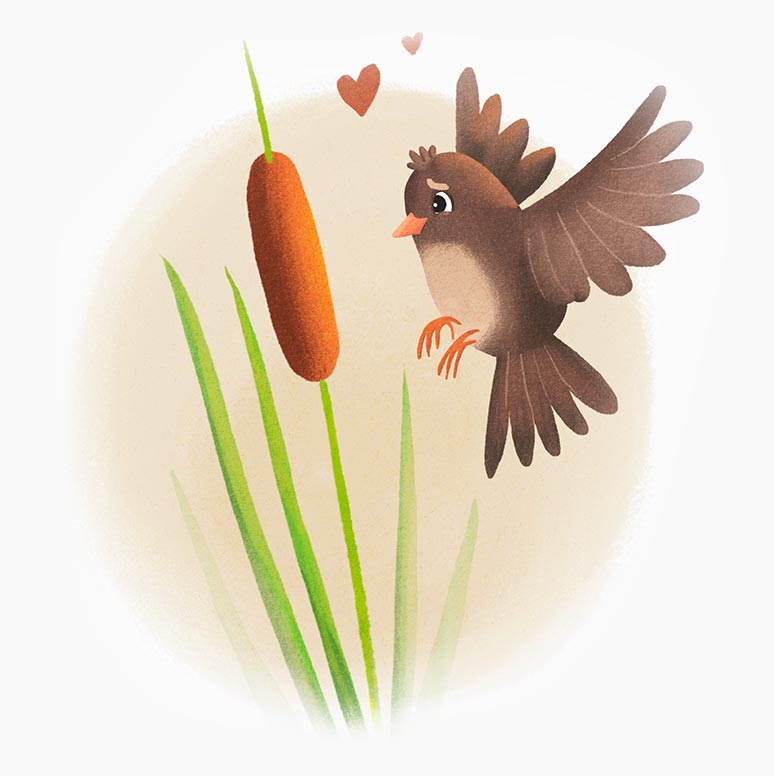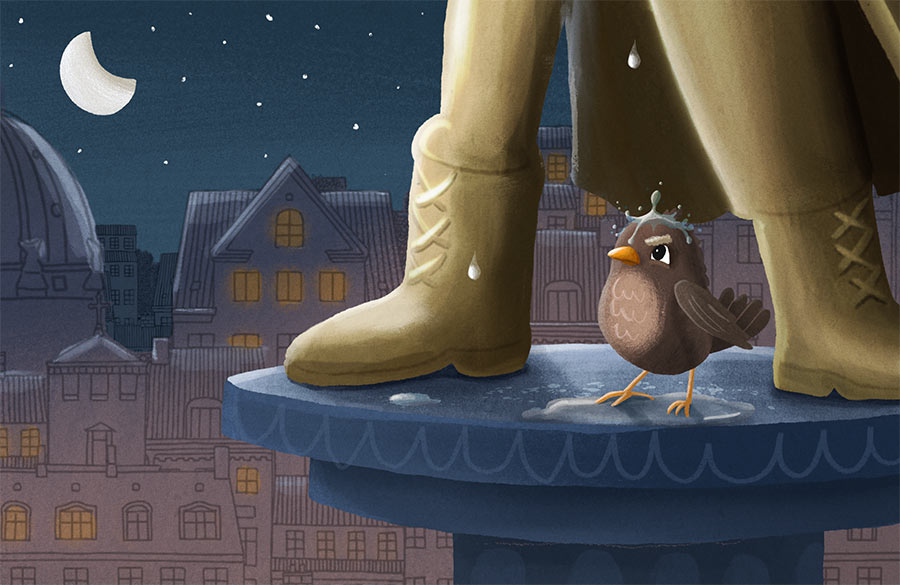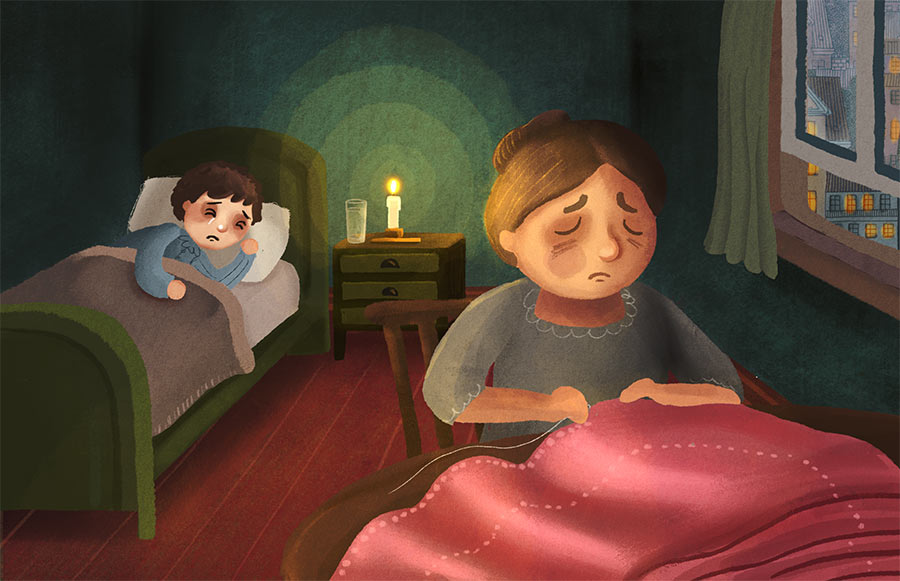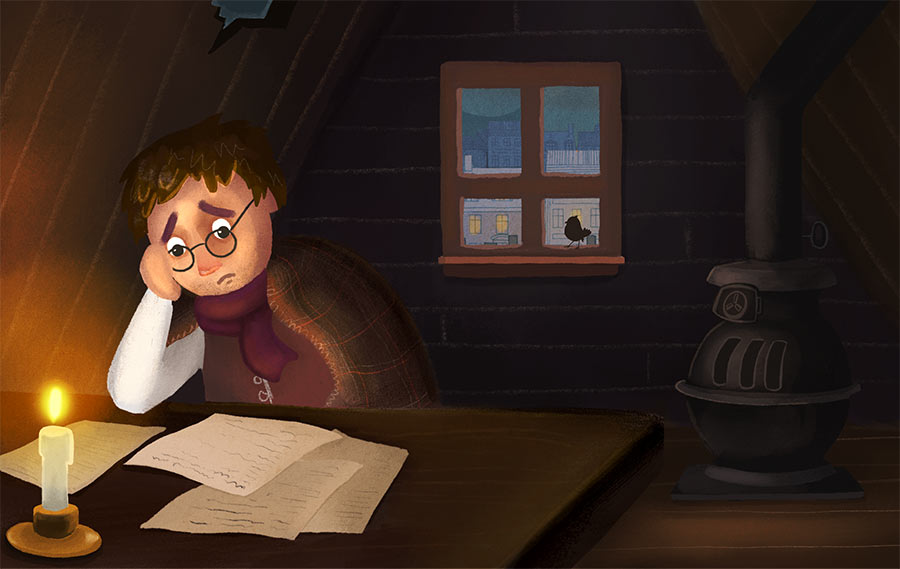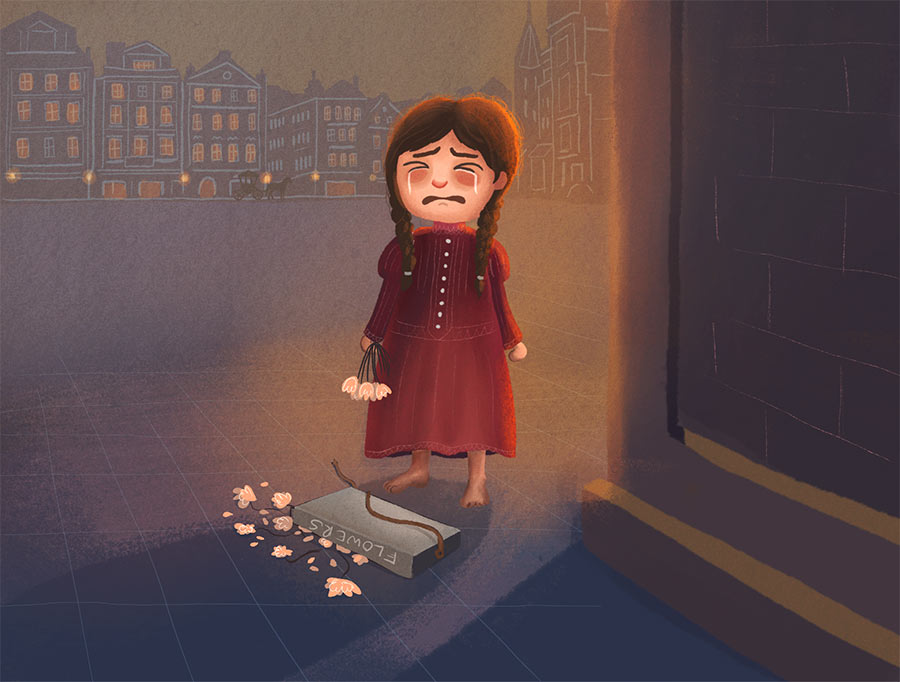La statua del Principe felice svetta sopra la città. È ricoperto di sottili foglie d’oro. I suoi occhi sono due zaffiri blu. Sulla spada c’è un grande rubino rosso. Lo amano tutti.
The statue of the Happy Prince stands high above the city. He is covered with fine gold leaf. His eyes are two blue sapphires. On his sword there is a big red ruby. Everyone loves him.
“Guarda il Principe Felice,” dice una madre al figlio che piange a dirotto. “Il Principe Felice non piange mai. Fai come lui!”
“Almeno qualcuno è felice in questa città” borbotta un uomo scorbutico mentre osserva quella bellissima statua.
“Sembra un angelo!” dicono i bambini nell’orfanotrofio.
“Look at the Happy Prince!” says a mother to her son, who is crying his eyes out (literally: crying a lot / pouring tears — “a dirotto” is also used when talking about heavy rain). “The Happy Prince never cries. Be more like him! (literally: do like him)”
“At least there is someone happy in this city,” grumbles a grumpy man, as he contemplates the beautiful statue.
“He looks like an angel!” say the children from the orphanage.
Una notte, un piccolo usignolo sorvola la città. I suoi amici sono andati tutti via. Sono volati in Egitto sei settimane fa.
L’usignolo è rimasto qui perché è innamorato di una bellissima canna. È alta, snella e si muove graziosa nel vento.
One night, a little nightingale flies over the city. His friends have all left. They flew to Egypt six weeks ago.
The nightingale remained here because he is in love with a beautiful reed. She is tall, slender and moves gracefully in the wind.
Gli altri usignoli l’avevano preso in giro.
“Che sciocco,” avevano detto.
“Non ha il becco d'un quattrino…”
“Né un lavoro fisso…”
The other nightingales had made fun of him.
“How ridiculous,” they said.
“She doesn't have a penny to her name…” (literally: “she doesn’t have a money’s beak” — a common expression)
“Nor a steady job…”
Poi gli altri usignoli erano partiti per l’Egitto e il piccolo usignolo aveva iniziato a stancarsi della sua amante.
“Sì, è bellissima. Ma le piace viaggiare?” si chiedeva. “Alla mia futura moglie deve piacere viaggiare!”
Then the other nightingales left for Egypt and the little nightingale began to get tired of his lover.
“Yes, she is beautiful. But does she like to travel?" he wondered. “My future wife must like to travel!”
Così un giorno chiede alla canna: “Vuoi venire in Egitto con me? Ci divertiremo tantissimo! Ti porto a vedere le piramidi!”
Ma la canna scuote la testa.
“Benissimo, allora andrò da solo!” risponde l’usignolo. “Addio!” E vola via, verso la città.
So one day he asks the reed: “Do you want to come to Egypt with me? We'll have so much fun! I'll take you to see the pyramids!”
But the reed shakes her head.
“Very well, then I'll go alone!” replies the nightingale. "Goodbye!" And he flies away, towards the city.
Quando arriva in città è già notte. “Dove dormirò?” si chiede. Vede la statua del Principe Felice. “Ah! Dormirò lì!” dice. “Il panorama sarà magnifico!”
Quindi atterra tra i piedi del Principe Felice.
When he arrives in the city it is already night. “Where will I sleep?” he wonders. He sees the statue of the Happy Prince. “Ah! I'll sleep there!” he says. “The view will be magnificent!”
So he lands between the Happy Prince's feet.
Si guarda intorno. “Fantastico! Ho una camera da letto d’oro!” Sta per addormentarsi quando ecco che gli cade addosso una goccia d’acqua – plop!
“Piove?” si chiede. “Non vedo nuvole…”
Poi cade un’altra goccia.
“Che statua del cavolo! Non mi protegge neanche dalla pioggia!” dice. “Vado a trovarmi un bel comignolo, che è meglio…”
He looks around. "Fantastic! I have a golden bedroom!” He is about to fall asleep when a drop of water falls on him – plop!
"Is it raining?" he wonders. “I don't see any clouds…”
Then another drop falls.
“What a lousy statue! It doesn't even protect me from the rain!” he says. “I'm going to find myself a nice chimney instead.” (literally: “a nice chimney, which is better”)
Ma poi ecco che – PLOP – cade un’altra goccia. L’usignolo alza la testa. E cosa vede?
Gli occhi del Principe Felice sono pieni di lacrime che gli rotolano lungo le guance dorate. Com’è triste il suo viso nel chiaro di luna! L’usignolo prova pietà per lui.
But then – PLOP – another drop falls. The nightingale looks up (literally: lifts its head). And what does he see?
The Happy Prince's eyes are filled with tears, which are rolling down his golden cheeks. How sad is his face in the moonlight! The nightingale feels pity for him.
“Chi sei?” chiede alla statua.
“Sono il Principe Felice.”
“E allora perché piangi?” chiede l’usignolo. “Mi stai bagnando.”
"Who are you?" he asks the statue.
“I am the Happy Prince.”
“Then why are you crying?” asks the nightingale. “You're getting me wet.”
“Quando ero vivo e avevo un cuore umano, non piangevo mai,” dice la statua. “Vivevo nel Palazzo Sans-Souci. Nessuno soffriva nel Palazzo Sans-Souci. Ogni sera andavo a ballare nel gran salone. Di giorno, giocavo in giardino con i miei amici. Il giardino era circondato da mura altissime, ma non chiedevo mai cosa ci fosse dall’altra parte. E perché avrei dovuto chiederlo? Ero circondato da tante cose bellissime.
“When I was alive and had a human heart, I never cried,” the statue says. “I lived in Sans-Souci Palace. No one ever felt bad (literally: suffered) in Sans-Souci Palace. Every evening I went dancing in the large hall. During the day, I played in the garden with my friends. The garden was surrounded by very high walls, but I never asked what was on the other side. And why would I ask? I was surrounded by so many beautiful things.
Quando ero vivo, mi chiamavano tutti il Principe Felice. E sì, ero felice… se il piacere e la felicità sono la stessa cosa. Ma poi sono morto e mi hanno messo qui. Ora posso vedere tutta la tristezza e la bruttezza della mia città. Ho il cuore di piombo, ma non riesco a smettere di piangere.”
When I was alive, everyone called me the Happy Prince. And yes, I was happy… if pleasure and happiness are the same thing. But then I died and they put me here. Now I can see all the sadness and ugliness of my city. My heart is lead, but I can't stop crying."
“Cosa? Ha il cuore di piombo?” pensa l’usignolo tra sé e sé. “Pensavo fosse fatto d’oro!” Ma non lo dice ad alta voce. È troppo educato.
"What? Does he have a heart of lead?” the nightingale thinks to himself. “I thought he was made of gold!” But he doesn't say it out loud. He is too polite.
La statua continua a parlare: “Lontano da qui c’è una stradina. In quella stradina c’è una casetta. Una delle finestre è aperta e vedo una donna. È seduta a un tavolo. Ha il viso stanco e preoccupato. Ha le mani rosse e piene di calli.
The statue continues to speak: “Far from here there is a small street. In that street there is a small house. One of the windows is open and I see a woman. She is sitting at a table. Her face is tired and worried. Her hands are red and calloused (literally: full of callouses).
È una sarta e sta cucendo un vestito per una ricca signora. Suo figlio è a letto con la febbre. Vuole delle arance, ma sua madre non ha abbastanza soldi per comprarle. Puoi solo fargli bere l’acqua del fiume. Così il bambino continua a piangere.
She is a seamstress and she is sewing a dress for a rich lady. Her son is in bed with a fever. He wants some oranges, but his mother doesn't have enough money to buy them. She can only give him river water to drink. (Literally: You can only make him drink river water.) So the boy continues to cry.
Piccolo usignolo, c’è un rubino sulla mia spada. Portalo a quella donna. Adesso sono una statua. Non posso portarglielo io.”
Little nightingale, there is a ruby on my sword. Take it to that woman. I am a statue now. I can't take it to her myself"
“Mi dispiace, non posso,” dice l’usignolo. “Devo andare in Egitto. I miei amici mi aspettano. Voleranno lungo il Nilo, parleranno con i fiori di loto, dormiranno nella tomba del grande Re… Devo andare anch’io! Voglio vedere tutte quelle cose!”
“I'm sorry, I can't,” says the nightingale. “I have to go to Egypt. My friends are waiting for me. They will fly along the Nile, they will talk to the lotus flowers, they will sleep in the tomb of the great King... I must go too! I want to see all those things!”
“Piccolo usignolo,” dice il Principe. “Ti prego, fammi da messaggero. Solo per questa notte. Quel bambino muore di sete, e sua madre è così triste.”
“Ma a me non piacciono i bambini,” dice l’usignolo. “Mi tirano sempre le pietre. Certo, non mi prendono mai, ma è comunque da maleducati!”
“Little nightingale,” says the Prince. “Please be my messenger. Just for tonight. That child is so thirsty (literally: dies of thirst), and his mother is so sad.”
“But I don't like children,” says the nightingale. “They always throw stones at me. Sure, they never get me, but it's still rude!”
Ma il Principe Felice sembra triste, e l’usignolo si sente in colpa.
“È molto freddo,” dice, “ma resterò ancora una notte per aiutarti.”
“Grazie, piccolo usignolo,” dice il Principe.
Così l’usignolo rimuove il rubino dalla spada del Principe. Lo afferra con il becco e vola sopra i tetti della città.
But the Happy Prince looks sad, and the nightingale feels guilty.
“It's very cold,” he says, “but I'll stay one more night to help you.”
“Thank you, little nightingale,” says the Prince.
So the nightingale removes the ruby from the Prince's sword. He holds it in his beak and flies over the roofs of the city.
Vola sopra la cattedrale, con i suoi angeli di marmo bianco.
Vola sopra il fiume e vede le lanterne appese agli alberi delle navi.
Vola sopra il mercato e sente un venditore gridare “Arance! Venite a comprare delle bellissime arance!”
He flies over the cathedral, with its white marble angels.
He flies over the river and sees the lanterns hanging from the ships' masts.
He flies over the market and hears a vendor shouting “Oranges! Come and buy some beautiful oranges!”
Vola sopra il palazzo e sente la musica e i balli. Una ragazza e il suo fidanzato sono sul balcone del palazzo.
“Le stelle sono così belle,” dice il ragazzo. “Come te…”
“Spero che il mio vestito sarà pronto in tempo per il ballo,” dice la ragazza. “La mia sarta è lentissima!”
He flies over the palace and hears the music and dancing. A girl and her boyfriend are on the balcony of the palace.
“The stars are so beautiful,” says the boyfriend. "Like you…"
“I hope my dress will be ready in time for the ball,” says the girl. “My seamstress is sooooo slow!”
Alla fine l’usignolo raggiunge la casa della donna. Guarda attraverso la finestra. Il bambino si dimena sul letto in preda alla febbre. La madre è così stanca che si è addormentata sul tavolo da cucito.
Eventually the nightingale reaches the woman's house. He looks through the window. The child writhes on the bed in the grips of fever. The mother is so tired that she has fallen asleep at the sewing table.
L’usignolo entra in casa e con gentilezza poggia il rubino sul tavolo. Poi vola intorno al letto del bambino, facendogli aria con le proprie ali.
“Non ho più caldo,” dice il bambino. “Forse sto guarendo…”
The nightingale enters the house and gently places the ruby on the table. He then flies around the child's bed, fanning him with his wings.
“I'm not hot anymore,” says the boy. “Maybe I'm getting better… ”
L’usignolo ritorna dal Principe Felice. Gli racconta quello che ha fatto.
“Che strano,” dice l’usignolo. “Fa freddo, ma io sento caldo.”
“Perché hai compiuto una buona azione,” dice il Principe.
Il piccolo usignolo inizia a pensare, poi si addormenta. (Pensare gli fa sempre venire sonno.)
The nightingale returns to the Happy Prince. He tells him what he did.
“It’s strange,” says the nightingale. “It's cold, but I feel warm.”
“(That’s) because you have done a good deed,” says the Prince.
The little nightingale begins to think, then falls asleep. (Thinking always makes him sleepy.)
Al mattino l’usignolo va a fare il bagno nel fiume.
“Stasera andrò in Egitto!” dice. È felicissimo.
Passa la giornata visitando le attrazioni turistiche della città. Dovunque va, i passeri cinguettano chiedendosi: “Chi è questo straniero raffinato? Non può essere un usignolo. Qui? In inverno?!”
All’usignolo piace essere al centro dell’attenzione. Si diverte tantissimo.
In the morning the nightingale goes to bathe in the river.
“Tonight I'm going to Egypt!” he says. He is very happy.
He spends the day visiting the city's tourist attractions. Wherever he goes, sparrows chirp, wondering, “Who is this refined stranger? He can't be a nightingale. Here? In winter?!"
The nightingale likes to be the center of attention. He enjoys it immensely.
Quando spunta la luna, torna dal Principe Felice.
“Posso portarti qualcosa dall’Egitto?” gli chiede. “Sto per partire.”
“Piccolo usignolo,” dice il Principe. “Ti prego, resta con me ancora una notte.”
When the moon rises, he returns to the Happy Prince.
“Can I bring you something from Egypt?” he asks him. “I'm about to leave.”
“Little nightingale,” says the Prince. “Please, stay with me one more night.”
“I miei amici mi aspettano in Egitto!” risponde l’usignolo. “Domani risaliranno il fiume. Ci saranno ippopotami nell’erba alta e a mezzogiorno i leoni gialli verranno sulla riva a bere. Hanno occhi verdi come smeraldi. Non posso perdermeli!”
“My friends are waiting for me in Egypt!” replies the nightingale. “Tomorrow they will go up the river. There will be hippos in the tall grass and at midday the yellow lions will come to the shore to drink. They have green eyes like emeralds. I can't miss them!”
“Piccolo usignolo,” dice il Principe. “Dall’altra parte della città vedo un giovane uomo. Vive in una mansarda piena di spifferi. È seduto davanti a una scrivania ricoperta di carte. Vuole scrivere un’opera teatrale, ma ha troppo freddo per tenere la penna in mano. Non ha soldi per comprare la legna da ardere, né per comprare da mangiare.”
“Little nightingale,” says the Prince. “Across town I see a young man. He lives in a drafty attic (literally: an attic full of drafts). He is sitting in front of a desk covered in papers. He wants to write a play, but he is too cold to hold the pen. He has no money to buy firewood, nor to buy food.”
“Va bene, resterò un’altra notte,” dice l’usignolo. “Hai un altro rubino?”
“Purtroppo no,” dice il Principe. “Ma ho i miei occhi. Sono zaffiri indiani. Portane uno a quel giovane. Potrà usarlo per comprare del cibo e un po’ di legna. Così potrà finire di scrivere la sua opera.”
“Okay, I'll stay another night,” says the nightingale. “Do you have another ruby?”
“Unfortunately not,” says the Prince. “But I have my eyes. They are Indian sapphires. Take one to that young man. He will be able to use it to buy some food and some wood. Then he can finish writing his play."
“Oh, no!” dice l’usignolo. “Non posso prendere uno dei tuoi occhi!”
“Piccolo usignolo,” dice il Principe. “Ti prego, fai come ti dico.”
Così l’usignolo prende l’occhio del Principe e vola verso la mansarda del giovane. Entrare è facile: c’è un buco nel tetto!
“Oh, no!” says the nightingale. “I can't take one of your eyes!”
“Little nightingale,” says the Prince. “Please do as I say.”
So the nightingale takes the Prince's eye and flies towards the young man's attic. Getting in is easy: there's a hole in the roof!
Il giovane si stringe la testa tra le mani. Non sente il fruscio delle ali dell’uccello mentre poggia lo zaffiro davanti a lui. Quando solleva lo sguardo, vede la bellissima pietra preziosa sulla scrivania.
“Un regalo!” grida. “A qualcuno piace il mio lavoro! Adesso potrò finire la mia opera!”
The young man holds his head in his hands. He does not hear the rustling of the bird's wings as he places the sapphire in front of him. When he looks up, he sees the beautiful gemstone on the desk.
"A gift!" he exclaims. “Someone likes my work! Now I will be able to finish my play!”
Il giorno dopo l’usignolo vola verso il porto. Atterra sull’albero di una grande nave. Guarda i marinai portare fuori il carico dalle stive. “Oh, issa!” gridano, “Oh, issa!”
“Vado in Egitto!” dichiara a gran voce, ma nessuno lo sente.
The next day the nightingale flies towards the port. He lands on the mast of a large ship. He watches the sailors take the cargo out of the holds. “Heave-ho” they shout, “Heave-ho!”
“I'm going to Egypt!” he declares loudly, but no one hears him.
Quando spunta la luna, torna dal Principe Felice.
“Sono venuto a salutarti,” dice l’usignolo.
“Piccolo usignolo,” dice il Principe. “Ti prego, resta con me ancora una notte.”
When the moon rises, he returns to the Happy Prince.
“I have come to say goodbye,” says the nightingale.
“Little nightingale,” says the Prince. “Please, stay with me one more night.”
“È arrivato l’inverno!” replica l’usignolo. “Presto nevicherà! Ma in Egitto c’è il sole. Vedrò le palme verdi. Vedrò i coccodrilli distesi nel fango. I miei amici stanno costruendo i loro nidi!
"Winter has arrived!" replies the nightingale. “It will snow soon! But in Egypt it is sunny. I will see the green palm trees. I will see crocodiles lying in the mud. My friends are building their nests!
Caro Principe, devo andare. Ma non mi dimenticherò mai di te! La prossima primavera ti porterò due bellissimi gioielli. Sostituiranno quelli che hai regalato. Il rubino sarà più rosso di una rosa e lo zaffiro sarà più bello del mare…”
Dear Prince, I must go. But I will never forget you! Next spring I will bring you two beautiful jewels. They will replace the ones you gave away. The ruby will be redder than a rose and the sapphire will be more beautiful than the sea..."
“Nella piazza sotto di noi,” dice il Principe, “c’è una bambina che vende fiori. Ne ha fatti cadere tanti, e adesso sono rovinati. Se non porta a casa un po’ di soldi, la sua famiglia morirà di fame. Sta piangendo. Non ha né scarpe né calzini. Non ha un cappotto per l’inverno, né un cappello caldo. Ti prego, prendi il mio altro occhio e dallo a lei.”
“In the square below us,” says the Prince, “there is a little girl selling flowers. She dropped many of them, and now they are ruined. If she doesn't bring home some money, her family will starve. She is crying. She has no shoes or socks. She doesn't have a winter coat or a warm hat. Please take my other eye and give it to her.”
L’usignolo sospira. “Posso restare ancora una notte,” dice. “Ma non posso prendere il tuo occhio! Senza occhi non potrai vedere più niente!”
“Piccolo usignolo,” dice il Principe. “Ti prego, fai come ti dico.”
The nightingale sighs. “I can stay one more night,” he says. “But I can't take your eye! Without eyes you won't be able to see anything!"
“Little nightingale,” says the Prince. “Please do as I say.”
L’usignolo rimuove l’altro occhio del Principe. Vola verso la piazza, passa di fianco alla bambina e le fa cadere il gioiello in mano.
“Ooh! Com’è bello!” esclama la bambina. Corre a casa ridendo.
The nightingale removes the Prince's other eye. He flies towards the square, passes by the little girl and drops the jewel into her hand.
“Ooh! How pretty!” the little girl exclaims. She runs home laughing.
L’usignolo ritorna dal Principe.
“Adesso sei cieco,” dice. “Quindi resterò con te.”
“No, piccolo usignolo,” dice il povero Principe. “Devi andare in Egitto!”
“No. Resterò con te per sempre,” dice l’usignolo. E si addormenta ai piedi del Principe.
The nightingale returns to the Prince.
“Now you're blind,” he says. “So I will stay with you.”
“No, little nightingale,” says the poor Prince. “You have to go to Egypt!”
"No. I will stay with you forever,” says the nightingale. And he falls asleep at the Prince's feet.
Il giorno dopo, l’usignolo si siede sulla spalla del Principe. Il Principe è cieco, così l’usignolo gli racconta delle storie. Gli parla dell’Egitto: il deserto, i dromedari, la Sfinge, le piramidi e gli enormi serpenti sulle palme.
The next day, the nightingale sits on the Prince's shoulder. The Prince is blind, so the nightingale tells him stories. He tells him about Egypt: the desert, the camels, the Sphinx, the pyramids, and the enormous snakes in the palm trees.
“Caro piccolo usignolo,” dice il Principe. “Parli di cose veramente straordinarie! Ma sai cos’è ancora più straordinario? La sofferenza delle persone. Non riesco a crederci! Vola sopra la mia città, piccolo usignolo, e dimmi cosa vedi.”
“Dear little nightingale,” says the Prince. “You speak of some truly extraordinary things! But do you know what's even more extraordinary? The suffering of people. I can not believe it! Fly over my city, little nightingale, and tell me what you see."
Così l'usignolo vola sopra la città. Vede i ricchi che vivono comodamente nelle loro bellissime case, mentre i mendicanti siedono davanti alle loro porte.
Vede bambini affamati seduti in vicoli bui.
So the nightingale flies over the city. He sees the rich living comfortably in their beautiful homes, while beggars sit at their doors.
He sees hungry children sitting in dark alleys.
Vede due ragazzini abbracciati sotto a un ponte. Stanno provando a riscaldarsi.
“Non potete dormire qui!” dice un poliziotto. “Andate via!” e i bambini corrono via sotto la pioggia.
He sees two little boys hugging under a bridge. They're trying to get warm.
“You can't sleep here!” says a policeman. "Get out!" and the children run away into the rain.
L’usignolo torna dal Principe e gli racconta quello che ha visto.
“Sono ricoperto d’oro,” dice il Principe. “Staccalo e dallo ai poveri.”
The nightingale returns to the Prince and tells him what he saw.
“I am covered in gold,” says the Prince. “Tear it off and give it to the poor.”
Pezzo dopo pezzo, l’usignolo rimuove il sottile strato d’oro che ricopre il Principe. Presto il Principe appare grigio e spento. Pezzo dopo pezzo, l’usignolo dona l’oro ai poveri. Le facce dei bambini diventano rosee. Ridono e giocano in strada.
“Adesso possiamo mangiare!”
Piece by piece, the nightingale removes the thin layer of gold covering the Prince. Soon the Prince appears gray and dull. Piece by piece, the nightingale gives the gold to the poor. The children's faces become rosy. They laugh and play in the street.
“Now we can eat!”
Poi arriva la neve. E poi il gelo. Le strade diventano bianche. Lunghi ghiaccioli penzolano dai tetti delle case. Tutti indossano un cappotto, e i bambini pattinano sul ghiaccio.
Then comes the snow. And then the frost. The streets become white. Long icicles dangle from the roofs of the houses. Everyone wears a coat, and the children skate on the ice.
Il povero usignolo ha sempre più freddo. Ma non lascia il Principe. Mangia le briciole che trova davanti alla porta del fornaio. Prova a riscaldarsi agitando le ali.
The poor nightingale gets colder and colder. But he doesn't leave the Prince. He eats the crumbs that he finds in front of the baker's door. He tries to warm himself by flapping his wings.
Alla fine, capisce che sta per morire. Si poggia per l’ultima volta sulla spalla del Principe.
“Addio, caro Principe,” gli sussurra.
“Sono felice che finalmente stai per andare in Egitto, piccolo usignolo,” dice il Principe. “Sei rimasto qui troppo a lungo.”
Eventually, he realizes that he is going to die. He rests on the Prince's shoulder for the last time.
“Goodbye, dear Prince,” he whispers to him.
“I'm happy that you are finally going to Egypt, little nightingale,” says the Prince. “You've stayed here too long.”
“Non sto andando in Egitto,” dice l’usignolo. “Sto per andare nella Casa della Morte. La Morte è la sorella del Sonno, non è vero?”
Bacia il Principe Felice e cade morto ai suoi piedi.
“I'm not going to Egypt,” says the nightingale. “I'm going to the House of Death. Death is the sister of Sleep, isn’t that right?”
He kisses the Happy Prince and falls dead at his feet.
Il mattino dopo, il sindaco della città passa davanti alla statua insieme ai consiglieri.
“O cielo! Il Principe Felice non ha per niente un bell’aspetto!” dice.
“Proprio per niente!” dicono i consiglieri. Sono sempre d’accordo con il sindaco.
The next morning, the city mayor passes in front of the statue together with the councilors.
“Oh heavens! The Happy Prince doesn't look good at all!” he says.
“Not at all!” say the councilors. I always agree with the mayor.
“Il rubino è sparito!” continua il sindaco. “E anche i suoi occhi! Non è più ricoperto d’oro! Non sembra più un Principe Felice! Sembra un mendicante!”
“Sì, un mendicante!” dicono i consiglieri.
“The ruby is gone!” continues the mayor. “And his eyes too! He is no longer covered in gold! He doesn't look like a Happy Prince anymore! He looks like a beggar!”
“Yes, a beggar!” say the councilors.
“E… o cielo… bontà divina… non credo ai miei occhi! C’è un uccello morto ai suoi piedi!” dice il sindaco. “Dobbiamo approvare una nuova legge: gli uccelli non possono morire sulle statue. Qualcuno lo metta per iscritto!”
E qualcuno lo mette per iscritto.
“And… oh heavens… goodness me… I don't believe my eyes! There is a dead bird at his feet!” says the mayor. “We need to pass a new law: ‘birds cannot die on statues’. Someone put that in writing!”
And someone puts it in writing.
Rimuovono la statua del Principe Felice. “Se non è bella, allora è inutile,” dice un articolo sul giornale.
Fondono la statua in una fornace, ma il cuore di piombo non si fonde.
“Che strano!” dice uno dei lavoratori nella fonderia. “Cosa ne facciamo di questo?”
“Uff… buttalo via,” dice un altro. “E non dirlo al capo.”
They pull down the statue of the Happy Prince. “If it’s not beautiful, then it’s useless,” says an article in the newspaper.
They melt the statue in a furnace, but the lead heart does not melt.
“How strange!” says one of the workers in the foundry. “What do we do with this?”
“Meh…throw it away,” says another. “And don't tell the boss.”
Allora buttano il cuore del Principe su un mucchio di immondizia, proprio di fianco all’usignolo morto.
So they throw the Prince's heart on a pile of trash, right next to the dead nightingale.
“Portami le due cose più preziose della città,” dice Dio a uno dei suoi angeli.
L’angelo gli porta il cuore di piombo e l’usignolo morto.
“Bring me the two most precious things in the city,” says God to one of his angels.
The angel brings him the lead heart and the dead nightingale.
“Hai scelto bene,” dice Dio. “Questo uccellino canterà nei giardini del Paradiso. E il Principe Felice riderà e canterà nella mia città d’oro.”
“You have chosen well,” says God. “This little bird will sing in the gardens of Paradise. And the Happy Prince will laugh and sing in my golden city."

Download this audio
Need help? How to download audio to your device


